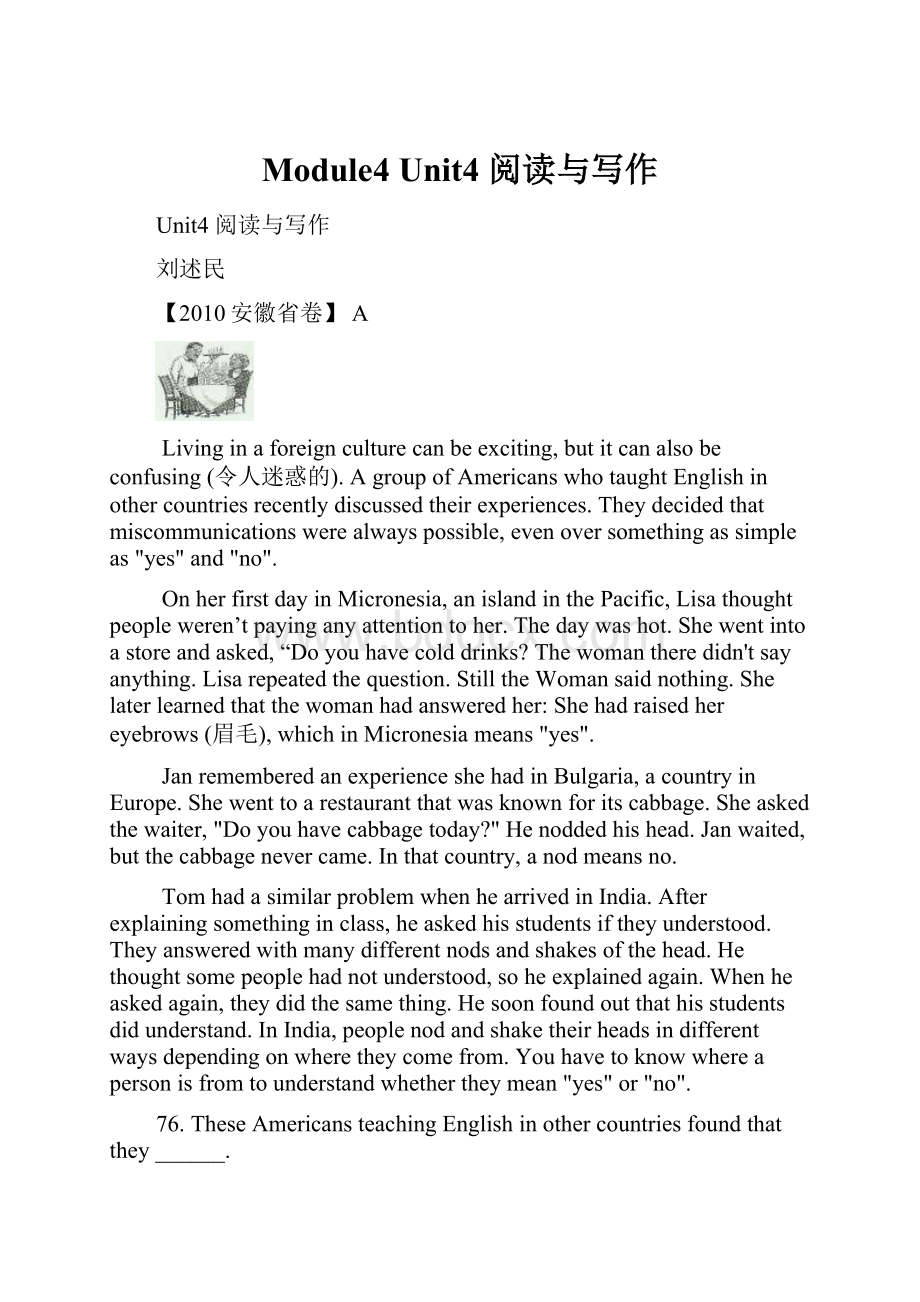Module4 Unit4 阅读与写作.docx
《Module4 Unit4 阅读与写作.docx》由会员分享,可在线阅读,更多相关《Module4 Unit4 阅读与写作.docx(12页珍藏版)》请在冰豆网上搜索。

Module4Unit4阅读与写作
Unit4阅读与写作
刘述民
【2010安徽省卷】A
Livinginaforeignculturecanbeexciting,butitcanalsobeconfusing(令人迷惑的).AgroupofAmericanswhotaughtEnglishinothercountriesrecentlydiscussedtheirexperiences.Theydecidedthatmiscommunicationswerealwayspossible,evenoversomethingassimpleas"yes"and"no".
OnherfirstdayinMicronesia,anislandinthePacific,Lisathoughtpeopleweren’tpayinganyattentiontoher.Thedaywashot.Shewentintoastoreandasked,“Doyouhavecolddrinks?
Thewomantheredidn'tsayanything.Lisarepeatedthequestion.StilltheWomansaidnothing.Shelaterlearnedthatthewomanhadansweredher:
Shehadraisedhereyebrows(眉毛),whichinMicronesiameans"yes".
JanrememberedanexperienceshehadinBulgaria,acountryinEurope.Shewenttoarestaurantthatwasknownforitscabbage.Sheaskedthewaiter,"Doyouhavecabbagetoday?
"Henoddedhishead.Janwaited,butthecabbagenevercame.Inthatcountry,anodmeansno.
TomhadasimilarproblemwhenhearrivedinIndia.Afterexplainingsomethinginclass,heaskedhisstudentsiftheyunderstood.Theyansweredwithmanydifferentnodsandshakesofthehead.Hethoughtsomepeoplehadnotunderstood,soheexplainedagain.Whenheaskedagain,theydidthesamething.Hesoonfoundoutthathisstudentsdidunderstand.InIndia,peoplenodandshaketheirheadsindifferentwaysdependingonwheretheycomefrom.Youhavetoknowwhereapersonisfromtounderstandwhethertheymean"yes"or"no".
76.TheseAmericansteachingEnglishinothercountriesfoundthatthey______.
A.shouldgoabroadforvacationsB.neededtolearnforeignlanguages
C.shouldoftendiscusstheirexperiencesD.hadproblemswithcommunications
77.PeopleinMicronesiashow"yes"by____.
A.noddingheadsB.raisingeyebrowsC.shakingheadsD.saying"no"
78.Tommisunderstoodhisclassatfirstbecause
A.hedidnotknowmuchaboutIndianculture
B.hedidn'texplaineverythingclearlyenough
C.somestudentsdidn'tunderstandhisquestions
D.hedidn'tknowwherethestudentscamefrom
79.WhichofthefollowingisTRUEaccordingto(根据)thispassage?
A.InBulgaria,noddingheadsmeansno.B.JantaughtEnglishonaPacificisland.
C.Lisawastryingtobuysomecabbage.
D.InIndia,onlyshakingheadsmeans"YES".
80.Thepassageismainlyabout_____.
A.bodylanguageinforeignrestaurantsB.classdiscussioninIndianschools
C.miscommunicationindifferentculturesD.Englishteachinginothercountries
B
Facialexpressionscarrymeaningthatisdeterminedbysituationsandrelationships.Forexample,inAmericanculture(文化)thesmileisingeneralanexpressionofpleasure.Yetitalsohasotheruses.Awoman’ssmileatapoliceofficerdoesnotcarrythesamemeaningasthesmileshegivestoayoungchild.Asmilemayshowloveorpoliteness.Itcanalsohidetruefeelings.Itoftencausesconfusion(困惑)acrosscultures.Forexample,manypeopleinRussiasmilingatstrangersinpublictobeunusualandevenimproper.YetmanyAmericanssmilefreelyatstrangersinpublicplaces(althoughthisislesscommoninbigcities).SomeRussiansbelievethatAmericanssmileinthewrongplaces;someAmericansbelievethatRussiansdon’tsmileenough.InSoutheastAsianculture,asmileisfrequentlyusedtocoverpainfulfeelings.Vietnamesepeoplemaytellasadstorybutendthestorywithasmile.
Ourfacesshowemotions(情感),butweshouldnotattemptto“read”peoplefromanothercultureaswewould“read”someonefromourownculture.Thefactthatmembersofoneculturedonotexpresstheiremotionsasopenlyasdomembersofanotherdoesnotmeanthattheydonotexperienceemotions.Rather,thereareculturaldifferencesintheamountoffacialexpressionspermitted.Forexample,inpublicandinformalsituationsmanyJapanesedonotshowtheiremotionsasfreelyasAmericansdo.Whenwithfriends,JapaneseandAmericansseemtoshowtheiremotionssimilarly.
ItisdifficulttogeneralizeaboutAmericansandfacialexpressivenessbecauseofpersonalandculturaldifferencesintheUnitedStates.Peoplefromcertainculturalbackgrounds(背景)intheUnitedStatesseemtobemorefaciallyexpressivethanothers.Thekeyistotrynottojudgepeoplewhosewaysofshowingemotionaredifferent.Ifwejudgeaccordingtoourownculturalhabits,wemaymakethemistakeof“reading”theotherpersonincorrectly.
【文章大意】
本文是一篇议论文。
文章阐述了面部表情取决于情景和人们之间的关系。
文章通篇阐述了面部表情的种种表现形式,以及文化之间的差异导致的面部表情的含义不同。
49.WhatdoesthesmileusuallymeanintheU.S.?
A.Love. B.Politeness. C.Joy. D.Thankfulness.
50.TheauthormentionsthesmileoftheVietnamesetoprovethatsmilecan___.
A.showfriendlinesstostrangers B.beusedtohidetruefeelings
C.beusedinthewrongplaces D.showpersonalhabits
51.Whatshouldwedobeforeattemptingto“read”people?
A.Learnabouttheirrelationswithothers.
B.Understandtheirculturalbackgrounds.
C.Findoutabouttheirpastexperience.
52.Whatwouldbethebesttitleforthetest?
A.CulturalDifferences B.SmilesandRelationship
C.FacialExpressiveness D.HabitsandEmotions
C.SHOWINGOURFEELINGS
Bodylanguageisoneofthemostpowerfulmeansofcommunication,oftenevenmorepowerfulthanspokenlanguage.Peoplearoundtheworldshowallkindsoffeelings,wishesandattitudesthattheymightneverspeakaloud.Itispossibleto"read"othersaroundus,eveniftheydonotintendforustocatchtheirunspokencommunication.Ofcourse,bodylanguagecanbemisread,butmanygesturesandactionsareuniversal.
Themostuniversalfacialexpressionis,ofcourse,thesmile–itsfunctionistoshowhappinessandputpeopleatease.Itdoesnotalwaysmeanthatwearetrulyhappy,however.Smilesaroundtheworldcanbefalse,hidingotherfeelingslikeanger,fearorworry.Thereareunhappysmiles,suchaswhensomeone"losesface"andsmilestohideit.However,thegeneralpurposeofsmilingistoshowgoodfeelings.
Fromthetimewearebabies,weshowunhappinessorangerbyfrowning.Inmostplacesaroundtheworld,frowningandturningone'sbacktosomeoneshowsanger.Makingafistandshakingitalmostalwaysmeansthatsomeoneisangryandthreateninganotherperson.
Therearemanywaysaroundtheworldtoshowagreement,butnoddingtheheadupanddownisusedforagreement,almostworldwide.Mostpeoplealsounderstandthatshakingtheheadfromsidetosidemeansdisagreementorrefusal.
HowaboutshowingthatIambored?
Lookingawayfrompeopleoryawningwill,inmostcases,makemeappeartobeuninterested.However,ifIturntowardandlookatsomeoneorsomething,peoplefromalmosteveryculturewillthinkthatIaminterested.IfIrollmyeyesandturnmyheadaway,ImostlikelydonotbelievewhatIamhearingordonotlikeit.
Beingrespectfultopeopleissubjective,basedoneachculture,butingeneralitisprobablynotagoodideatogiveahugtoabossorteacher.Inalmosteveryculture,itisnotusuallygoodtostandtooclosetosomeoneofahigherrank.StandingatalittledistancewithopenhandswillshowthatIamwillingtolisten.
Withsomanyculturaldifferencesbetweenpeople,itisgreattohavesomesimilaritiesinbodylanguage.Wecanoftenbewrongabouteachother,soitisanamazingthingthatweunderstandeachotheraswellaswedo!
D.THEOPENHAND—AUNIVERSALSIGN
Whenmeetingpeopleattheairport,mostpeoplesmileandshakehandswithpeopletheymeet.Weknowthatasmileisusuallyasignthatpeoplefeelfriendlyandhappy,butwhatifwedon'tknowwhothenewpersonis?
Whatifwearenotintroducedbyafriend?
Whatifwearemeetingastrangerinanunfamiliarplace?
Sometimespeoplearedangerousandhumanshavetofindwaystoprotectthemselves.Wehavetomakesurewecantrustpeoplewedonotknow,andwehavetoshowthatwearenotdangerous.Showingourhandsmeansthatwearenotarmed.Inmanyculturestoday,theWesterncustomofshakinghandsisused.Weuseourrighthand,whichisusuallystrongerthantheleftone.Ifweareusingourhandthisway,itcannotbeholdingaknifeoragun.Itshowsthatwetrusttheotherperson,andthattheotherpersoncantrustus.
Notallculturesusethehandshake,andpeopleinmanyAsianculturesdonotalwaystouchanotherperson.ThetraditionalgreetinginChinawastocoverthelefthandwiththerightandbow.Japanesepeoplemightcoveronehandwiththeotherand,dependingonwhomtheyaregreeting,bowslightlyorquitelow.InIndia,Hindupeoplejointheirhandsinfrontoftheirfacesandbowtheirheads.AMuslimwilltouchhisheart,mouthandforehead(额)toshowrespect.EvenyoungpeopleintheWestnowgiveeachotherthe"highfive",whentheyslap(拍)eachother'shandshighintheair.Theyareallkeepingtheirhandsbusy.Inalmostallcultures,tosmileandshowanopenrighthandmeans,"Welcome,youaresafewithme."
E.
Whenitcomesto(每当谈到…)gettingdressedinthemorning,menhaveiteasybecausetheykeepthingssimple:
theyputonasuit.Theykeepitsimilarlysimpleonthequestionofhuggingorshakinghandsatwork:
shakehands,always.
Clearly,thereissomedebateoverthequestionofwhetherbusinesswomenshouldhugorshakehands.But,asladies,wecan’truletheworlduntilwestophuggingatwork.
Astudyonhandshakesshowedthatpeoplearetwotimesmorelikelytorememberyouwhenyoushakehandswiththemthanwhenyouhugthem,regardlessof(无论)yourgender(性别).Theresearchersalsofoundthatpeoplereactto(对…作出反应)thosewithwhomtheyshakehandsbybeingmoreopenandfriendly.
Peoplewith“go